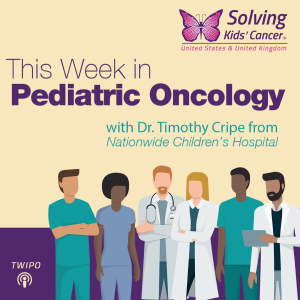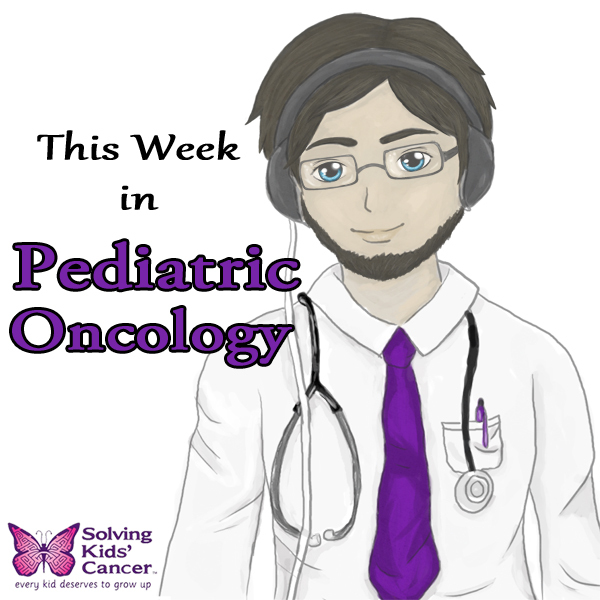This Week in Pediatric Oncology
sarcoma
Episodes

Monday Jul 17, 2017
Monday Jul 17, 2017
It’s an exciting time to be part of the childhood cancer research community, and this interview was focused on career advice for those interested in childhood oncology and research. The availability of genomic profiling of tumors, targeted agents and the development of new immunotherapies are increasing the opportunities available to patients today. This lively discussion addresses the importance of preclinical data, predictive biomarker studies and the measurement of responses, with specific references to Dr. Wagner’s experience with studying irinotecan. Dr. Wagner also answered questions about radiomics and how this imaging trend can provide more insights for enhanced radiology reporting.
Please send questions and comments to TWiPO@solvingkidscancer.org

Monday Oct 17, 2016
Monday Oct 17, 2016
TWiPO Host Dr. Timothy Cripe, with co-hosts Dr. Nilay Shah and Dr. Bhuvana Setty welcome Dr. Damon Reed, Director of the Adolescent and Young Adult Program at Moffitt Cancer Center and Leader of the Pediatric Cancer Foundation's pediatric phase I consortium, the Sunshine Project. Dr. Reed shares his view points on how we can improve and accelerate the current trajectory with regard to pediatric therapy development.

Thursday Oct 06, 2016
Thursday Oct 06, 2016
TWIPO hosts Dr. Timothy Cripe and Dr. Nilay Shah (Nationwide Children's Hospital) along with guest
host Dr. Ryan Roberts (Nationwide Children's Hospital), interview Dr. Elizabeth Lawlor who is a Professor of Pediatric
Oncology at University of Michigan and the Director of the Cancer Biology
Training Program at University of Michigan Health System. Dr. Lawlor, a Ewing Sarcoma specialist, discusses
new approaches to the cellular eco-system of tumors and provides commentary on the growing
landscape for women in science.

Monday Feb 10, 2014
Monday Feb 10, 2014
October
30, 2011Several just-published papers in the literature
relate to recent podcast episodes, and host Dr. Tim Cripe and co-host Dr. Lionel Chow review these interesting
developments.
0:55 Hedgehog Signaling: Recent papers
discussing this pathway in neuroblastoma and rhabdomyosarcoma are discussed,
with implications for treatment in these tumor types with itraconozole.
6:40 Cell phone and brain tumor risk: The
controversy concerning criticism by the Environmental Health Trust of a study
showing that cell phone use does not increase risk of brain tumors in children
is explored.
Accelerated approval of cancer drugs by the FDA
and implications for pediatric cancers.
15:30 Brentuximab for two types of lymphoma
21:20 Vemurafenib for melanoma
28:30 Crizotinib for non-small cell lung cancer
(and potential use in neuroblastoma)
42:30 Response to email regarding personalized
medicine TWiPO episode #17 and lab blog for Dr Charles Keller at OHSU
References:
Pediatr Blood Cancer. 2011 Dec 1;57(6):930-8.
doi: 10.1002/pbc.23174. Hedgehog pathway activity in
pediatric embryonal rhabdomyosarcoma and undifferentiated sarcoma: a report
from the Children's Oncology Group.
Int J Oncol. 2011 Oct;39(4):899-906. doi:
10.3892/ijo.2011.1076. Pharmacological inhibition of
the Hedgehog pathway preventshuman rhabdomyosarcoma cell growth.
Cancer Lett. 2011 Nov 28;310(2):222-31. Inhibition of the sonic hedgehog
pathway by cyplopaminereduces the CD133+/CD15+ cell compartment and the in
vitrotumorigenic capability of neuroblastoma cells.
Cell Phone Study Was Flawed, Say Some Experts by
Roxanne Nelson Medscape Oncology News.
The JNCI Study by Aydin et al on Risk of Childhood Brain Cancer from
Cellphone Use Reveals Serious Health Problems, Environmental Health Trust.
N Engl J Med. 2010 Nov 4;363(19):1812-21. Brentuximab
vedotin (SGN-35) for relapsed CD30-positive lymphomas.
FDA Approves Brentuximab for Two Lymphomas By:
ELIZABETH MECHCATIE, Oncology Report Digital Network.
Clin Cancer Res. 2011 Oct
15;17(20):6428-36. Brentuximab Vedotin (SGN-35).
FDA Approves Vemurafenib for Advanced Melanoma.
By: JANE SALODOF MACNEIL, Oncology Report Digital Network.
N Engl J Med. 2011 Jun
30;364(26):2507-16. Improved survival with
vemurafenib in melanoma with BRAFV600E mutation.
N Engl J Med. 2011 Jun 30;364(26):2547-8. Been
there, not done that--melanoma in the age of molecular therapy. http://www.ncbi.nlm.nih.gov/pubmed/21639809
Biochem J. 2011 Aug 15. Activating ALK mutations found in neuroblastoma are inhibited by
Crizotinib and NVP-TAE684.
N Engl J Med. 2010 Oct
28;363(18):1693-703. Anaplastic lymphoma kinase inhibition in non-small-cell
lung cancer.
Nature. 2007 Aug 2;448(7153):561-6. Epub 2007
Jul 11. Identification of the transforming EML4-ALK fusion gene in non-small-cell
lung cancer.
Science. 1994 Mar 4;263(5151):1281-4. Fusion of a kinase gene, ALK, to
a nucleolar protein gene, NPM, in non-Hodgkin's lymphoma.

Monday Feb 10, 2014
Monday Feb 10, 2014
October
18, 2011
Host Dr. Tim Cripe and co-host Dr. Lionel Chow
welcome special guest Dr. Jeff Toretsky on TWiPO to discuss his clinical and
research interest in Ewing's sarcoma. Dr. Toretsky explains the challenges of
developing a clinical grade drug from a small molecule for a specific target
such as EWS-FLI1. The small market for a disease like Ewing's creates
formidable hurdles for researchers, yet Dr. Toretsky is driven on by the
question "If I don't do this, who will?" (17:54 mins)
Dr. Jeff Toretsky is Professor of Oncology and
Pediatrics at Georgetown University. He graduated with BS in Biochemistry from
University of Wisconsin, Madison, WI, and recieved his MD from University of
Minnesota, Minneapolis, MN. He completed fellowship training at the NCI
Pediatric Branch.
Please send any questions or comments to
twipo@solvingkidscancer.org

Monday Feb 10, 2014
Monday Feb 10, 2014
October
07, 2011
Dr. Tim Cripe and co-hosts Dr. Lionel Chow and
Dr. Lars Wagner welcome special guest Dr. Stephen Lessnick for an in-depth
discussion on the progress to date in understanding the genetics of Ewing's
sarcoma. The challenges of interpreting the gene expression data as well as the
ethics of collecting tumor specimens for research purposes are also explored.
Dr.Stephen Lessnick is a Professor of Pediatrics and Oncological Sciences at
the University of Utah, where he also serves as an Attending Physician in
Pediatric Hematology/Oncology at Primary Children's Medical Center in Salt Lake
City, UT. He received his PhD in Molecular Biology from UCLA in 1994, and his
MD from UCLA in 1996, followed by a residency at Children's Hospital in Boston,
and a fellowship at the Dana-Farber Cancer Institute and Children's Hospital.
Currently, Dr. Lessnick is the Director of the Center for Children's Cancer
Research at Huntsman Cancer Institute, a Jon and Karen Huntsman Presidential
Professor in Cancer Research at the University of Utah, and is the Vice Chair
for Biology of the Bone Tumor Committee in the Children's Oncology Group.
Please send questions or comments to twipo@solvingkidscancer.org